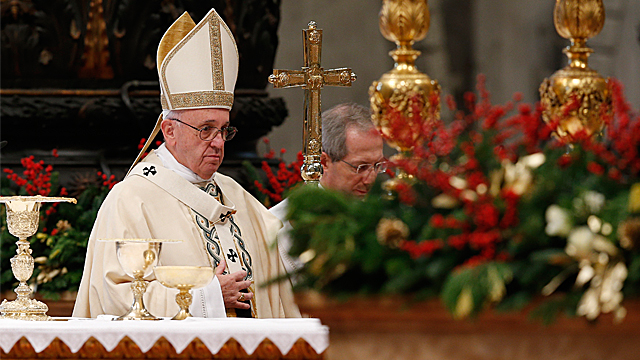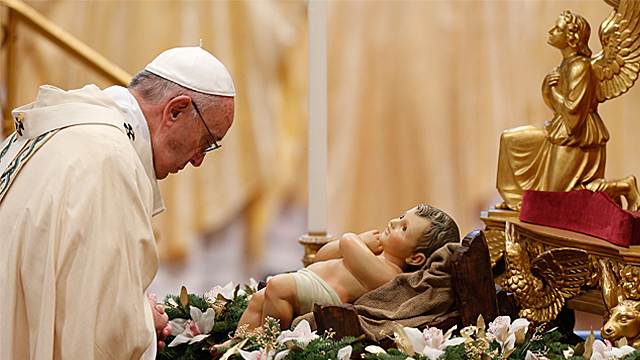

Pope Francis' Homily for Epiphany Celebration; Angelus Address
Salt + Light Media
Wednesday, January 6, 2016

On Wednesday morning, the Solemnity of the Epiphany, Pope Francis presided over the Eucharistic celebration in the Vatican Basilica. Below is the text of the homily the Pope pronounced after the proclamation of the Holy Gospel and the proclamation of the day of Easter, which this year is celebrated on March 27:
The words of the Prophet Isaiah – addressed to the Holy City of Jerusalem – arealso meant for us. They call us to rise and go forth, to leave behind all thatkeeps us self-enclosed, to go out from ourselves and to recognize the splendour of the light which illumines our lives: “Arise, shine; for your light has come, andthe glory of the Lord has risen upon you” (60:1). That “light” is the glory of theLord. The Church cannot illude herself into thinking that she shines with her own light. Saint Ambrose expresses this nicely by presenting the moon as a metaphorfor the Church: “The moon is in fact the Church… [she] shines not with her ownlight, but with the light of Christ. She draws her brightness from the Sun ofJustice, and so she can say: ‘It is no longer I who live, but Christ who lives inme’” (Hexaemeron, IV, 8, 32). Christ is the true light shining in the darkness. To the extent that the Church remains anchored in him, to the extent thatshe lets herself be illumined by him, she is able to bring light into the lives ofindividuals and peoples. For this reason the Fathers of the Church saw in her themysterium lunae.We need this light from on high if we are to respond in a way worthy of thevocation we have received. To proclaim the Gospel of Christ is not simply oneoption among many, nor is it a profession. For the Church, to be missionarydoes not mean to proselytize: for the Church to be missionary means to giveexpression to her very nature, which is to receive God’s light and then to reflectit. This is her service. There is no other way. Mission is her vocation; toshine Christ’s light is her service. How many people look to us for thismissionary commitment, because they need Christ. They need to know the faceof the Father.The Magi mentioned in the Gospel of Matthew are a living witness to the fact thatthe seeds of truth are present everywhere, for they are the gift of the Creator,who calls all people to acknowledge him as good and faithful Father. The Magirepresent the men and woman throughout the world who are welcomed into thehouse of God. Before Jesus, all divisions of race, language and culturedisappear: in that Child, all humanity discovers its unity. The Church has thetask of seeing and showing ever more clearly the desire for God which ispresent in the heart of every man and woman. This is the service of the Church,with the light that she reflects: to draw out the desire for God present in everyheart. Like the Magi, countless people, in our own day, have a “restless heart”which continues to seek without finding sure answers – it is the restlessnessof the Holy Spirit that stirs in hearts. They too are looking for a star to show them the path to Bethlehem.How many stars there are in the sky! And yet the Magi followed a new anddifferent star, which for them shone all the more brightly. They had longpeered into the great book of the heavens, seeking an answer to theirquestions – they had restless hearts –, and at long last the light appeared. Thatstar changed them. It made them leave their daily concerns behind and setout immediately on a journey. They listened to a voice deep within, which led them to follow that light. It was the voice of the Holy Spirit, who works in allpeople. The star guided them, until they found the King of the Jews in a humbledwelling in Bethlehem.All this has something to say to us today. We do well to repeat the questionasked by the Magi: “Where is the child who has been born the King of the Jews? For we observed his star at its rising, and have come to pay him homage” (Mt2:2). We are impelled, especially in an age like our own, to seek the signswhich God offers us, realizing that great effort is needed to interpret them andthus to understand his will. We are challenged to go to Bethlehem, to find theChild and his Mother. Let us follow the light which God offers us – that tinylight. The hymn in the breviary poetically tells us that the Magi lumen requiruntlumine – that tiny light. The light which streams from the face of Christ, full ofmercy and fidelity. And once we have found him, let us worship him with all ourheart, and present him with our gifts: our freedom, our understanding and ourlove. True wisdom lies concealed in the face of this Child. It is here, in thesimplicity of Bethlehem, that the life of the Church is summed up. For here isthe wellspring of that light which draws to itself every individual in the world andguides the journey of the peoples along the path of peace.

Pope Francis said on Wednesday the experience of the Magi urges us not to settle for mediocrity and not to scrape a living but instead examine with passion the great mystery of life. He also said the Magi teach us to recognize the majesty in humility and learn how to knee in front of it. The Pope’s comments came during his Angelus address to the crowds gathered in St. Peter's Square on the feast of the Epiphany.
Pope Francis said the gospel account of the Magi who came from afar to worship the Baby Jesus gives “an air of universality” to the feast of the Epiphany. He said “the Church has always seen in herself the image of all humanity” and through this feast wishes, as it were, “to guide, with respect, every man and woman of this world towards the Child Jesus who was born to save us all.”
The Pope explained that both the Magi and the shepherds who came to pay homage to the Christ Child teach us that in order to meet Jesus “we need to raise our eyes towards the sky and not be bent over ourselves and our own egoism" but instead have our “hearts and our minds open to the horizon of God.”
Just as the Magi experienced a great joy when seeing the star in the sky, it is also a great consolation for us, said the Pope, to feel we are “being guided and not abandoned to our own destinies.” The experience of the Magi, he continued, “is an appeal for us not to settle for mediocrity and not to scrape a living” but instead “seek the sense of things” and “to examine with passion the great mystery of life.” Pope Francis said it also teaches us “to not to be scandalized by the smallness and poverty” but “to recognize the majesty in humility and learn how to knee in front of it.”
In further remarks after the recitation of the Angelus prayer, Pope Francis expressed his “spiritual closeness” to our “brothers and sisters of the Christian Orient,” Catholics and Orthodox many of whom celebrate Christmas on January 7th, saying he wished them peace and happiness.
The Pope noted that the Epiphany is also the Church’s World Day of Missionary Childhood and explained that this is the feast day for “children who with their prayers and sacrifice" help their more needy peers by becoming “missionaries and witnesses of brotherhood and sharing.”
Watch Pope Francis celebrate Mass for the Epiphany below:
--
CNS photo/Paul HaringRelated Articles:
>>













